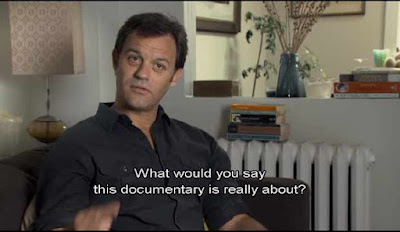Sarah Polley's new film, Women Talking, is opening "in limited" theaters this week. It will open in more theaters January 23, 2023...if all goes well.
or
Who's Your Daddy?
Director Sarah Polley's third film Stories We Tell is a documentary all about her, and in which she barely appears. In telling the story of her life, she manages to do it in the best way—by mentioning everybody else in her life, making her an observer, reporter, and a happy, but no less disinterested, accident in the process. But, it is also one of a handful of films that dares to consider truth, and what its relationship is to reality.
The project started with a family joke (and, by the way, ends with one of the best last lines in a movie from the past couple years or so)—that Sarah looked nothing like her father. When she was born, her mother Diane would say, probably too much and too loudly, "Look, she's a redhead. How did that happen?" And there was rampant speculation, never uttered in the family until every one had grown up, that maybe Sarah's dad wasn't...her dad.So, what's the story?
We meet, through interviews and home movies (mixed in with Polley-generated 8mm simulation/recreations, which...when you finally realize it...makes it feel like cheating, but one gets over it) with friends and family of her parents, who give us some of the story. Not all of it, and only what they know, their impressions of it, and their opinions. Diane and Michael Polley were both former actors who came across each other in the Canadian theater circuit, fell in love and got married—his first, her second. Despite the similarities in trade, they couldn't be less alike—she was effusive, bouncy, the life of the party and a general flibbertigibbit; he was studious, thoughtful, writerly, and maybe too dull for her. When they married, she stayed home with the kids, and he quit acting to support them.The marriage hit a rough patch, and Diane took an acting gig in Toronto and was gone for several weeks. Michael went to visit and see the play, and they rekindled their marriage—when Diane came back home, she was pregnant with Sarah. The view-points vary greatly—the siblings are irreverent, but respectful of their mother, who died of cancer very young, and in the film feels like a free spirit in every sense of the word; the father, befuddled but not really caring because he loves his kids, his wife and it is what is; friends worry how much they're revealing about Diane, and the stories stay pretty consistent with minor deviations, except for one important detail—they don't know what happened, and can only offer idle speculation. The movie comes down to a conclusion—Sarah wasn't biologically of Michael, and it must have been one of her co-stars in the play—suspicion falling immediately on the one redhead in the cast. But, that's just the beginning of the film, and the "hook" of it. What we get is along the lines of the many sides and opinions of Citizen Kane, but the focus being Sarah's mother—whose effervescence belies a complexity and back-story that defies it. The impression one initially gets of her as flighty, darkens and dissipates when one sees her past, and the figure of fun, often dismissed in the interviews with "well, that was Diane..." becomes one you can understand, empathize with, and, ultimately, root a bit for. There's a video clip of her (the real one, not the recreation) singing a satire version of "Ain't Misbehavin'" (called "I'm Misbehavin'") sung with a somewhat "can't help it" ruefulness, that's charming.
But, it doesn't stop there. Once we know best who's Father, it becomes an interesting tale of "who should tell this story/who owns it?" especially considering the effect it might have on the survivors, and how the participants feel about it and "What It All Means." The film becomes Polley's attempt to "tell all sides" even though there are those who think it should be focused on one aspect, with a singular point of view. Polley, the subject, has no axe to grind here, as she wasn't around when all this happened, and is familially invested in...everybody. She displays the same sensitivity and odd humor that she brings to her fictional films, and her editing choices—what she shows and doesn't show, and the way she juxtaposes and does a "he said/she said" with the interviews—makes the film itself fun to watch, despite the twists and turns of the narrative. Interesting, fascinating, and though-provoking.
Sarah Polley—the origin story







No comments:
Post a Comment